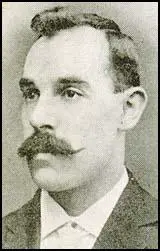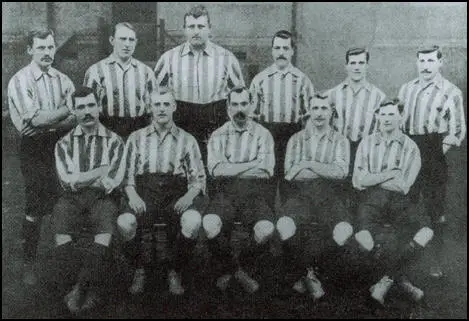George Hedley

George Hedley was born in South Bank, Middlesbrough on 20th July 1876. He played local football before joining Sheffield United in 1897. At the time the team contained a lot of talented players including William Foulke, Ernest Needham and Walter Bennett.
Sheffield United won the First Division championship of the Football League in the 1897-1898 season. The club struggled the following year in the league but the team beat Derby County in the 1899 FA Cup Final.
With William Foulke in goal and Needham organizing the defence, Sheffield United was a very difficult team to play against and in the 1899-1900 season they once again had the best defensive record in the league. The club finished in second place to Aston Villa.
On 9th March, 1901, Hedley won his first and only international cap. The English team included Ernest Needham, C. B. Fry and John Robinson. England beat Ireland 3-0 but he failed to score and was not selected again.
The following season Hedley was a member of the Sheffield United team that reached the 1901 FA Cup Final against Tottenham Hotspur. Hedley and the other players were on a £10 win bonus. However, the Southern League side was on a promise of £25 a man if they won the cup. The game ended in a 2-2 draw. However, Spurs won the replay 3-1.

Hedley was also a member of the Sheffield United team that played Southampton in the 1902 FA Cup Final. Sheffield took an early lead but Southampton scored a controversial equalizer and the game was drawn. C. B. Fry wrote in the Southern Echo: "The outstanding feature of the match was the grand goalkeeping of Foulke. he made a number of good saves, and on two or three occasions cleared the ball from what appeared impossible positions. Once, near the end, from a corner, he effected an absolute miracle with four or five men right on to him."
William Foulke was furious that the equalizing goal had been given after the game he went searching for the referee. The linesman, J. T. Howcroft, described how Frederick Wall, secretary of the Football Association, tried to placate the goalkeeper: "Foulke was exasperated by the goal and claimed it was in his birthday suit outside the dressing room, and I saw F. J. Wall, secretary of the FA, pleading with him to rejoin his colleagues. But Bill was out for blood, and I shouted to Mr. Kirkham to lock his cubicle door. He didn't need telling twice. But what a sight! The thing I'll never forget is Foulke, so tremendous in size, striding along the corridor, without a stitch of clothing."
Walter Bennett was injured and could not take part in the replay. He was replaced by the young William Barnes on the wing. The game was only two minutes old when a massive clearing kick by William Foulke reached George Hedley and Sheffield United took an early lead. Led by the outstanding Ernest Needham, Sheffield dominated play but Albert Brown managed to score a equalizer. Southampton began to apply pressure but according to the Athletic News, "Foulke was invincible". With ten minutes to go, Needham took a shot that the Southampton goalkeeper, John Robinson, could only block, and Barnes was able to hit the ball into the unguarded net. Sheffield won 2-1 and Hedley had won another medal.
After the game George Hedley was transferred to the defeated finalists. During his time at Sheffield United he had scored 34 goals in 120 matches.
Hedley returned to the Football League when he signed for Wolverhampton Wanderers in 1908. Wolves enjoyed a good run in the FA Cup in the 1907-08 season. They beat Bury (2-0), Swindon Town (2-0), Stoke City (1-0) and Southampton (2-0) to reach the final against Newcastle United. Newcastle had just finished 4th in the First Division during this season, and after two successive league titles they were hot favourites to win the cup against their Second Division opponents. It was also Newcastle's third FA Cup final appearance in 4 years.
Newcastle United had the vast majority of the possession but couldn't penetrate the Wolves defence. After 40 minutes a poor clearance went straight to Kenneth Hunt, the Wolves right-half. Jim Lawrence, the Newcastle goalkeeper, got a hand the Hunt's tremendous shot but could not keep it out of the net. Soon afterwards George Hedley scored a second. In the second-half, Newcastle's constant pressure resulted in a goal for Jimmy Howie. Just before the end, Wolves broke away and Billy Harrison added a third.
The team was in the Second Division at the time and despite Hedley scoring 65 goals in a 193 games he was unable to help them gain promotion to the First Division. Hedley retired from professional football in 1912.
George Hedley died in 1942.
Primary Sources
(1) J. A. H. Catton, The Story of Association Football (1926)
I have been scribbling about footballers from the days when I had some hair until now a comb is an encumbrance and scanty locks are silvered o'er with the toll of years. Seldom have players complained to me about what I have thought fit to set down.
Two instances to the contrary come to mind. When Sheffield United and Southampton met in the Final Tie for The Cup at the Crystal Palace in 1902 there was a curious incident, for when the second half was advanced and the United were leading by a goal scored by Common, Edgar Chadwick broke away and made a pass to Harry Wood, the father of Arthur Wood, who kept goal for Clapton Orient. The famous old Wolverhampton forward went on and scored. Thus the match was drawn-most unexpectedly.
At that time I had left the Press Box and was sitting on the pavilion near Mr. G.S. Sherrington, one of the vice-presidents of the Football Association, and Mr. P.A. Timbs, who was then on the Council. They turned and said that the goal was offside, but Tom Kirkham, of Burslem, the referee, gave a goal. I said that the ball grazed the knickers of Peter Boyle, the Sheffield United back, in transit. Strangely enough, John T. Howcroft, who was the linesman on the opposite side of the field to the grandstand, thought so, too.
The following Saturday the Final was replayed at the Crystal Palace, and I went down to the dressing cubicles in the pavilion to ascertain the teams before they went out. Peter Boyle saw me and most indignantly denied that the ball ever touched him, and threatened to do all manner of things with my poor body. No doubt he was annoyed and at the moment heated.
I felt the truth of what Lafcadio Hearn once said: "What is wanted in a time of embarrassment and danger is a good head not a strong arm." So I temporised about optical delusions and mistakes to which all men are subject.
Then there appeared in front of me a naked giant-one William Foulke, the Sheffield goalkeeper, who stood all six feet two inches and pulled down the scale at twenty stones. If ever man deserved the name of The Mountain he did. Foulke was good tempered and sought to quell the storm by humour. So he put himself in fighting position and said: "Come on, lad. You're just about my weight"-and I was a miserable five feet and under eleven stones. I could have laughed, but Boyle's brow was menacing.
The situation was far from pleasant, but Ernest Needham opened the door of his cubicle and pulled me inside. "Nudger" Needham surprised me by saying that I had left the Press Box and never saw the goal. I explained, and my peril passed. There is no doubt that I was mistaken-but two of the officials were the same.
(2) Graham Phythian, Colossus: The True Story of William Foulke (2005)
As the teams made their way from the pitch, a Southampton fan decided to vent his frustration on Needham, hitting the Sheffielder in the face. Perhaps he chose Needham because of the half-back's small stature. If it were so, it were a grievous fault. Nobody present - with the single obvious exception - could have been a more redoubtable opponent in such a confrontation than hard-as-nails Needham. Normally the soul of diplomacy, the United captain retaliated with a left-right combination that wouldn't have disgraced Bob Fitzsimmons. At this point the spectator, concluding it might be a good idea to make himself scarce, turned and ran - into the arms of a couple of policemen. The next day back in Sheffield there was a rumour that it was Foulke who had hit back. But as the Monday's Sheffield Telegraph wryly connnented: "The assailant may be glad it was only Needham."
Foulke's anger at Wood's last-minute goal was still smouldering as the teams reached the dressing rooms. Were the moneyed southerners about to steal a march as they had done the previous year? In broad terms, the South equalled London and the establishment. Jack Robinson, the Southampton goalie, was the usual choice for international honours, getting the nod over Foulke every time. And there was right-back C.B. Fry, landed gent and lauded amateur, the Corinthian whose well-bred insults directed at the professionals and the proles in football were well known. All these ingredients no doubt added to the cocktail of resentment simmering away inside the big man.
